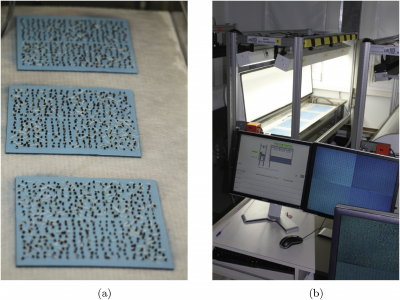Science
New Adaptive Bayesian Sampling Enhances Plant Imaging Efficiency

A research team has introduced an innovative adaptive Bayesian sampling framework that significantly reduces the volume of data required for plant imaging while maintaining precision. This advancement represents a crucial step forward in optimizing data efficiency in scientific research.
The framework employs a sophisticated algorithm that adapts sampling methods based on the complexity of the data being analyzed. By intelligently determining how much data is necessary at any given time, researchers can achieve accurate imaging with far less information. This not only accelerates the data collection process but also minimizes the storage and processing costs associated with large datasets.
The implications of this approach extend beyond mere convenience. With reduced data volume, researchers can focus on critical information, thus enhancing the overall quality of their analyses. This is particularly beneficial in fields where timely and accurate imaging is essential, such as agriculture and environmental science.
Impact on Research and Development
The introduction of the adaptive Bayesian sampling framework has the potential to reshape methodologies across various scientific disciplines. According to the research team, the new approach allows for more efficient use of resources, which could lead to faster research cycles and more robust findings.
In practical terms, this means that scientists can obtain high-quality images of plant structures without being burdened by the limitations of traditional data collection methods. The adaptive nature of the framework ensures that researchers are not inundated with superfluous information, allowing them to concentrate on what truly matters.
Moreover, the framework’s ability to maintain accuracy while decreasing data volume could result in more sustainable practices within research environments. As the scientific community increasingly seeks to reduce its environmental footprint, this innovation offers a promising solution.
The work conducted by the research team underscores the importance of continual advancements in imaging technology. By harnessing the power of adaptive Bayesian sampling, researchers are positioned to tackle complex challenges in plant imaging and beyond, paving the way for future discoveries.
In conclusion, the adaptive Bayesian sampling framework stands as a significant advancement in the realm of scientific research. It not only enhances data efficiency but also supports the pursuit of high-quality outcomes. As researchers continue to explore its applications, the broader implications for various fields could lead to transformative changes in how data is collected and analyzed.
-

 Science1 month ago
Science1 month agoNostradamus’ 2026 Predictions: Star Death and Dark Events Loom
-

 Technology2 months ago
Technology2 months agoOpenAI to Implement Age Verification for ChatGPT by December 2025
-

 Technology6 months ago
Technology6 months agoDiscover the Top 10 Calorie Counting Apps of 2025
-

 Health4 months ago
Health4 months agoBella Hadid Shares Health Update After Treatment for Lyme Disease
-

 Health5 months ago
Health5 months agoAnalysts Project Stronger Growth for Apple’s iPhone 17 Lineup
-

 Technology4 months ago
Technology4 months agoElectric Moto Influencer Surronster Arrested in Tijuana
-

 Education5 months ago
Education5 months agoHarvard Secures Court Victory Over Federal Funding Cuts
-

 Health5 months ago
Health5 months agoErin Bates Shares Recovery Update Following Sepsis Complications
-

 Technology6 months ago
Technology6 months agoDiscover How to Reverse Image Search Using ChatGPT Effortlessly
-

 Technology7 months ago
Technology7 months agoMeta Initiates $60B AI Data Center Expansion, Starting in Ohio
-

 Technology7 months ago
Technology7 months agoRecovering a Suspended TikTok Account: A Step-by-Step Guide
-

 Science3 months ago
Science3 months agoStarship V3 Set for 2026 Launch After Successful Final Test of Version 2





















